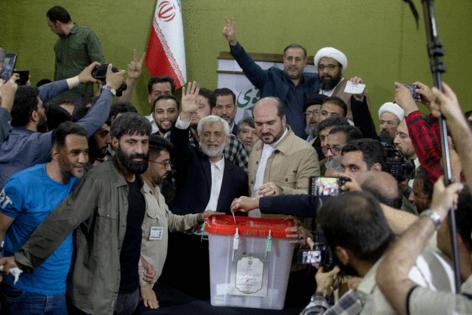Iranian presidential runoff pits reformer against hard liner
Published in Political News
Iran’s presidential runoff opened on Friday with the election’s only reformist candidate, Masoud Pezeshkian, facing off against anti-Western Islamist Saeed Jalili in the race to run the country’s government.
The two men cast their votes around mid-morning in Tehran, choosing polling stations in working-class neighborhoods on the outskirts of the metropolis.
The rivals have spent the past four days campaigning across the Islamic Republic, trying to rally support from an electorate that mostly shunned the ballot box in last week’s first round. They’ve clashed in televised debates over the future of the now-defunct nuclear deal, internet censorship and how to revive the struggling economy.
Pezeshkian, a 69-year-old lawmaker and heart surgeon by training, and 58-year-old Jalili, an ex-chief negotiator on the nuclear program, are battling to take over from the government of late President Ebrahim Raisi, whose death in a helicopter crash in May triggered the snap election.
Polls opened at 8 a.m. local time and are scheduled to close at 6 p.m., but can be extended to midnight. Early results are expected on Saturday morning.
The election comes at a time of unprecedented opposition to Iran’s ruling clerical establishment and as turmoil and conflict dominate the Middle East.
Tension between Iran and Israel has escalated since Israel started an ongoing military assault on Gaza — a response to the Oct. 7 attack by Hamas, which is backed by Tehran and considered a terrorist organization by the U.S. The two countries traded direct fire in April, though stopped short of a full-blown war.
‘A Coin Flip’
The record low turnout of about 40% in last Friday’s vote underscored the crisis of legitimacy that’s been facing the Islamic Republic and its ultimate ruler, Supreme Leader Ayatollah Ali Khamenei. Widespread demonstrations and a violent uprising in 2022 have rattled the ruling clerics and empowered security forces to suppress dissent as much as possible.
Underscoring the extent to which those protests still loom large for many voters, several families of those killed by Iranian security forces in the unrest have used social media to publicly boycott the election, including the father or Mahsa Amini, the 22-year-old Kurdish-Iranian woman whose death in police custody sparked the uprising.
...continued
©2024 Bloomberg L.P. Visit bloomberg.com. Distributed by Tribune Content Agency, LLC.







Comments